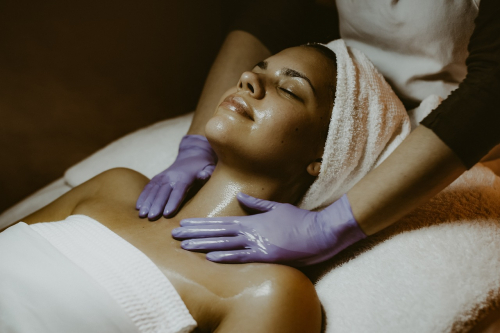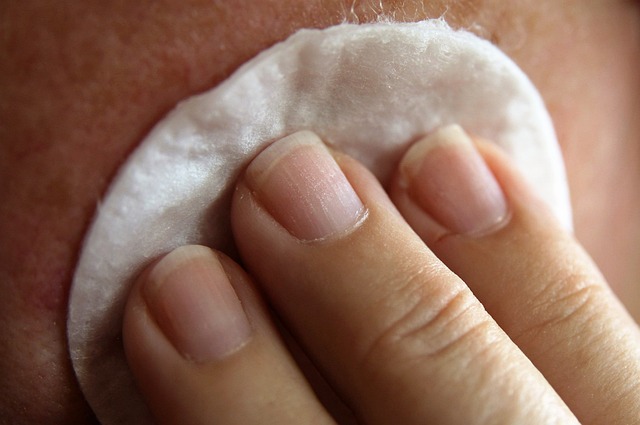Healthy Nurse, Healthy Nation™ Blog - Beautiful Skin, Beautiful Mind: The Link Between Skin Care and Mental Health
Published
Have you ever noticed how life's ups and downs seem to etch themselves onto your skin? When you're going through stressful times, your skin is often the first place to show it.
Your mind and skin are connected. It's the perfect time to examine this relationship and the transformative power of a skin care routine.

The Skin-Mind Connection
Everyone gets stressed at some point. But have you ever connected the dots between feeling stressed and how your skin looks?
Maybe a few days before a big test, acne flares up. Or after a stressful week at work, your skin gets blotchy and red.
Chronic stress can manifest itself on your skin through cortisol production. This hormone, which your body produces when you're stressed, can cause skin changes such as acne. Research shows that stress promotes acne by causing an overproduction of oil, which can clog your pores and lead to breakouts. Stress can also prompt unhealthy behaviors, like skipping your skin care regimen or forgetting to use sunscreen.
"Stress creates a fight-or-flight response, releasing cortisol into your body," says Thomas (Tom) Allison, a founding team member of CeraVe Skincare. "Getting stressed out is universal, and we often experience one or many skin symptoms during stress."
Cortisol also impacts your skin through inflammation. It can disrupt your skin's barrier, leading to dryness, itchiness, redness, and blotchiness. Your skin, it turns out, is the billboard of your emotional state.
Skin Care = Self-Love
Think of a simple skin care routine as your armor against the challenges of life. The foundation of healthy skin involves a daily routine of cleansing, moisturizing, and applying SPF protection. And look for warning signs that something is wrong with your skin. See your dermatologist if:
- A skin condition lasts more than a few days and isn't improving.
- You experience itching, redness, or hair loss.
- Your skin feels abnormally warm.
- You notice any changes in moles, such as alterations in size, shape, or color.
"A healthy skin care routine can be de-stressing in itself,” says Tom. “But it's essential to recognize when skin changes might require medical attention.”
Make your skin care routine a time to de-stress by trying these ideas:
- Give your face some love with a gentle massage to ease tension.
- Go for skin care with scents like lavender for a calming spa vibe.
- Take it slow — mindfully apply each product, savoring the pampering.
- Treat yourself to a warm compress or hydrating face mask for extra relaxation.
- Add soft lights and play your favorite tunes to unwind.
Embracing a proactive approach to skin care nurtures your skin and bolsters your mental resilience. And when you take charge of your skin care, you equip yourself to face life's challenges. Taking care of the most visible part of your body and prioritizing self-care — even if it adds a few minutes to your daily routine — can boost your confidence and self-acceptance.
How to Make Informed Skin Care Choices
There are many skin care products on the market, some more affordable than others. How do you know which one is right for your skin type?
When it comes to making smart choices, rely on trustworthy sources. Lean on:
- The American Academy of Dermatology (AAD) is a great place to start for some unbiased recommendations.
- Dermatologists have deep knowledge of skin care, and some even work with skin care companies to formulate the best possible products.
A saturated skin care market might seem overwhelming. But it’s good since it increases affordability and accessibility. The idea is simple: Skin care shouldn't break the bank. Plus, many skin issues are long-term affairs, so getting larger product sizes at reasonable prices is a smart move.
Accessibility is another big win. Skin care products are now popping up in all sorts of places, from online websites to major stores and your local pharmacy. No more hunting for the right products; they're right there, ready when you need them.
“The goal is to make skin care as stress-free as possible,” says Tom. “Making skin care accessible and affordable for all isn’t just a trend; it's a movement. It's saying that taking care of your skin is a fundamental part of self-care and health for everyone.”
Skin Health and Your Well-Being
Healthy skin isn't just about looks. It's about feeling good in your body, accepting yourself, and having the confidence to take on the world.
Skin care experts are paying more attention to the connection between skin health and mental well-being because our skin is more than an outer layer; it's part of our whole health picture. With self-care and a thoughtful skin care routine, you're treating your skin — and empowering yourself to face life with confidence and resilience.
For more inspiration, read our related blogs:
- Tips to Promote Nurse Self-Care Through Skin Care
- How Do You Routinely Practice Self-Care?
- Build Your Self-Care Routine Challenge (Day 1)
What does your daily skin care routine entail? Share with us in the comments below.

Not a member of Healthy Nurse, Healthy Nation (HNHN) yet? Join today!
Sign up for our monthly challenges!
Blog Quality of Life
12/18/2023 2:20pm CST



Post a Comment or Question